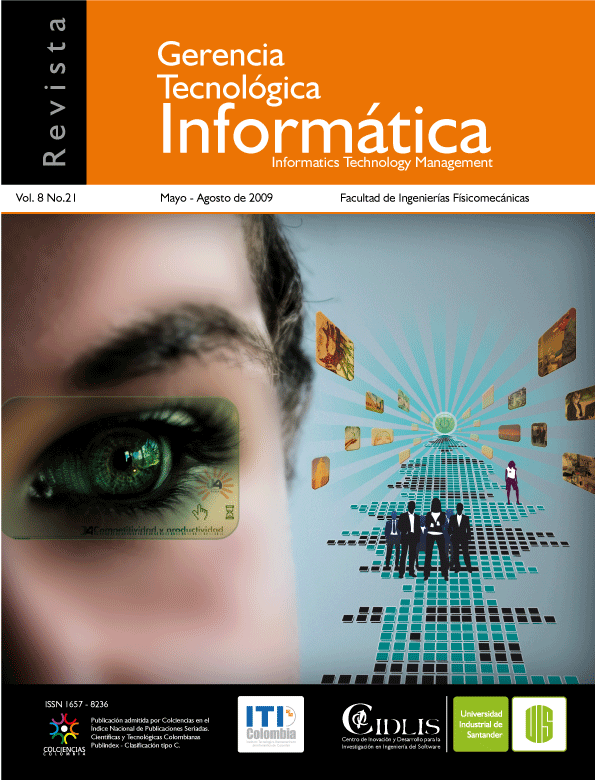LA TRANSFERENCIA DE TECNOLOGÍA EN LOS PROCESOS DE INVESTIGACIÓN DE LA UNIVERSIDAD INDUSTRIAL DE SANTANDER
Published 2010-08-02
How to Cite
Abstract
RESUMEN
La revisión y el análisis del proceso de transferencia en la Universidad, comprende un enfoque hacia la mejora del desarrollo económico de la región y el fortalecimiento de los objetivos institucionales. El presente documento contiene la descripción de la situación actual del proceso de transferencia realizado por los centros y grupos de investigación de la Universidad Industrial de Santander.
Para el mejoramiento del proceso de transferencia, la investigación se centró en el diseño de la estructura de un modelo de transferencia tecnológica, para el cual se hizo necesaria la identificación de los actores que intervienen, los factores que favorecen y desfavorecen, las modalidades, los instrumentos y mecanismos de transferencia conocidos.
El desarrollo del diseño de la estructura de un modelo de transferencia tecnológica permitió encontrar las oportunidades de mejora en el proceso de transferencia desarrollado por los centros y grupos de investigación de la Universidad: Como respuesta, y contribución para mejorar dicha situación, se procedió a la formulación de fases, interfases, bloques, herramientas y mecanismos que conformarían el modelo y que soportado con otra serie de estrategias permitiría evaluar y dar continuidad al proceso de transferencia hasta el logro de una mejor apropiación de tecnologías por parte de los actores sociales identificados.
PALABRAS CLAVES: Tecnología, Gestión del conocimiento, Gestión tecnológica, Transferencia de tecnológica, Modelo de transferencia, Asimilación de tecnología, Apropiación de tecnología.
ABSTRACT
The revision and the analysis of the process of transference in the University, include understand an approach towards the improvement of the economic development of the region and the fortification of the institutional objectives. The present document contains the description of the present situation of the process of transference made by the centers and groups of investigation of the Industrial University of Santander.
For the improvement of the transference process, the investigation was centered in the design of the structure of a model of technological transference, for which the identification became necessary of the actors who take part, the factors that favor and work against, the modalities, the instruments and well-known mechanisms of transference.
The development of the design of the structure of a model of technological transference allowed to find the deficiencies in the process of transference developed by the centers and groups of the University, and to improve this situation it was come to the formulation from phases, interphases, blocks, tools and mechanisms that would conform the model and that supported with another series of strategies would allow to evaluate and to give continuity to the transference process until the profit of the appropriation of technologies by part of the social actors.
KEYWORDS: Technology, Management of the knowledge, Technological management, Transference of technological, Transference model, Assimilation of technology, Appropriation of technology.
Downloads
References
- Arrow, K. “Economic welfare and the allocationof resources for invention in National Bureau ofEconomic Research. The rate and direction ofinventive activity”. Princeton University Press.Princeton. 1962.
- Contreras, Carlos, “Transferencia de tecnología apaíses en desarrollo”, (Caracas, Venezuela, 1979.)
- Gaynor, G. “Management of Technology:description, scope, and implications. Gaynor, H.(ed.). “Handbook of Technology Management”.McGraw-Hill. (New York. 1996.)
- INFANTE, Arturo. “Administración y distribuciónde los recursos financieros provenientes de lainvestigación, consultoría e interacción entre launiversidad y el sector productivo”, en Vinculaciónuniversidad - sector productivo: (Santiago deChile. Bid-Secad-Cinda, 1990, pág. 111.)
- Martínez,Eduardo. “Ciencia, tecnología y desarrollo:Interrelaciones teóricas y metodológicas”, EditorialNueva Sociedad, (Caracas, Venezuela. 1994.)
- Moreno, Félix; Matainoros, Martha. “ContratosTecnológicos” en Waissbluth, Mario (editor).“Conceptos generales de gestión tecnológica”,BID-SECAB-CINDA, (Santiago, Chile, 1990.)
- Sagasti, Francisco R. y Guerrero, Mauricio, “Eldesarrollo científico y tecnológico de América Latina”,INTAL BID, (Buenos Aires, Argentina, 1974.)
- SOLLEIRO, José Luis. “La vinculación de la UniversidadNacional Autónoma de México con el sector productivo”,en: Vinculación universidad - sector productivo:(Santiago de Chile. Bid-Secad-Cinda, 1990, pág. 285.)
- Waissbluth Mario, et al. “El paquete tecnológicoy la innovación”. BID-SECAB-CINDA (editores).Conceptos generales de gestión tecnológica.(Santiago de Chile. Chile 1990.)
- www.banrepublica.gov.co/blaavirtual/letra-c/colombia/eco6
- www.campus-oei.org
- www.colciencias.gov.co/agenda
- www.colombiajoven.gov.co/FAQ_INT
- www.gsi.dit.upm.es/~fsaez/innovaciontecnologica.html
